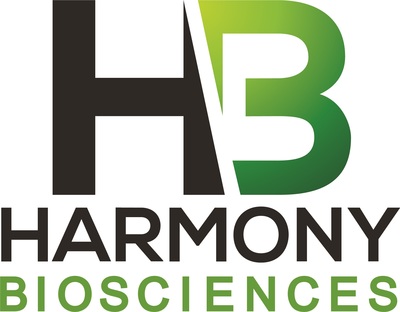HARMONY BIOSCIENCES INITIATES GLOBAL PHASE 3 REGISTRATIONAL TRIAL (TEMPO STUDY) OF PITOLISANT IN PATIENTS WITH PRADER-WILLI SYNDROME
The TEMPO study initiation follows a successful End-of-Phase 2 meeting with the
"The initiation of our Phase 3 TEMPO study, a global, randomized, double-blind, placebo-controlled, multicenter trial with an open-label extension period, reflects continued positive momentum across our organization spanning our lifecycle management programs in PWS and other indications with high unmet medical need," said Kumar Budur, M.D., M.S., Chief Medical Officer of Harmony Biosciences. "With the initiation of this study and the FDA's recent decision to grant ODD for pitolisant in PWS, we aim to potentially introduce a new, non-scheduled treatment option for EDS and the common behavioral symptoms in patients living with this condition."
Approximately 15,000 – 20,000 people in the U.S. are living with PWS, the majority experiencing behavioral symptoms and more than half with EDS. There is currently no FDA-approved treatment for EDS in this patient population.
"Our progress in expanding the clinical applications of pitolisant in PWS and in other rare diseases, remains promising. These efforts are integral to our life cycle management programs, which, if successful, could benefit over 100,000 patients living with unmet medical needs," Budur added.
Pitolisant is marketed as WAKIX® in the U.S. and is FDA approved to treat EDS or cataplexy in adult patients with narcolepsy. Pitolisant is not approved for use in patients with PWS and is currently being evaluated as an investigational agent in this patient population.
About Prader-Willi Syndrome
PWS is an orphan/rare, genetic neurological disorder with many of the symptoms resulting from hypothalamic dysfunction. The hypothalamus is the part of the brain that controls both sleep-wake state stability and signals that mediate the balance between hunger and satiety, resulting in the main symptoms in patients with PWS, hyperphagia (an intense persistent sensation of hunger accompanied by food preoccupations, an extreme drive to consume food, food-related behavior problems, and a lack of normal satiety), EDS and behavioral symptoms. Other features include low muscle tone, short stature, and cognitive impairment.
About WAKIX® (pitolisant) Tablets
WAKIX, a first-in-class medication, is approved by the U.S. Food and Drug Administration for the treatment of excessive daytime sleepiness or cataplexy in adult patients with narcolepsy and has been commercially available in the U.S. since Q4 2019. It was granted orphan drug designation for the treatment of narcolepsy in 2010, and breakthrough therapy designation for the treatment of cataplexy in 2018. WAKIX is a selective histamine 3 (H₃) receptor antagonist/inverse agonist. The mechanism of action of WAKIX is unclear; however, its efficacy could be mediated through its activity at H₃ receptors, thereby increasing the synthesis and release of histamine, a wake promoting neurotransmitter. WAKIX was designed and developed by Bioprojet (
INDICATIONS AND USAGE
WAKIX is indicated for the treatment of excessive daytime sleepiness or cataplexy in adult patients with narcolepsy.
IMPORTANT SAFETY INFORMATION
Contraindications
WAKIX is contraindicated in patients with known hypersensitivity to pitolisant or any component of the formulation. Anaphylaxis has been reported. WAKIX is also contraindicated in patients with severe hepatic impairment.
Warnings and Precautions
WAKIX prolongs the QT interval; avoid use of WAKIX in patients with known QT prolongation or in combination with other drugs known to prolong the QT interval. Avoid use in patients with a history of cardiac arrhythmias, as well as other circumstances that may increase the risk of the occurrence of torsade de pointes or sudden death, including symptomatic bradycardia, hypokalemia or hypomagnesemia, and the presence of congenital prolongation of the QT interval.
The risk of QT prolongation may be greater in patients with hepatic or renal impairment due to higher concentrations of pitolisant; monitor these patients for increased QTc. Dosage modification is recommended in patients with moderate hepatic impairment and moderate or severe renal impairment (see full prescribing information). WAKIX is not recommended in patients with end-stage renal disease (ESRD).
Adverse Reactions
In the placebo-controlled clinical trials conducted in patients with narcolepsy with or without cataplexy, the most common adverse reactions (≥
Drug Interactions
Concomitant administration of WAKIX with strong CYP2D6 inhibitors increases pitolisant exposure by 2.2-fold. Reduce the dose of WAKIX by half.
Concomitant use of WAKIX with strong CYP3A4 inducers decreases exposure of pitolisant by
H1 receptor antagonists that cross the blood-brain barrier may reduce the effectiveness of WAKIX. Patients should avoid centrally acting H1 receptor antagonists.
WAKIX is a borderline/weak inducer of CYP3A4. Therefore, reduced effectiveness of sensitive CYP3A4 substrates may occur when used concomitantly with WAKIX. The effectiveness of hormonal contraceptives may be reduced when used with WAKIX and effectiveness may be reduced for 21 days after discontinuation of therapy.
Use in Specific Populations
WAKIX may reduce the effectiveness of hormonal contraceptives. Patients using hormonal contraception should be advised to use an alternative non-hormonal contraceptive method during treatment with WAKIX and for at least 21 days after discontinuing treatment.
There is a pregnancy exposure registry that monitors pregnancy outcomes in women who are exposed to WAKIX during pregnancy. Patients should be encouraged to enroll in the WAKIX pregnancy registry if they become pregnant. To enroll or obtain information from the registry, patients can call 1-800-833-7460. The safety and effectiveness of WAKIX have not been established in patients less than 18 years of age.
WAKIX is extensively metabolized by the liver. WAKIX is contraindicated in patients with severe hepatic impairment. Dosage adjustment is required in patients with moderate hepatic impairment.
WAKIX is not recommended in patients with end-stage renal disease. Dosage adjustment of WAKIX is recommended in patients with moderate or severe renal impairment.
Dosage reduction is recommended in patients known to be poor CYP2D6 metabolizers; these patients have higher concentrations of WAKIX than normal CYP2D6 metabolizers.
Please see the Full Prescribing Information for WAKIX for more information.
To report suspected adverse reactions, contact Harmony Biosciences at 1-800-833-7460 or the FDA at 1-800-FDA-1088 or www.fda.gov/medwatch.
About Harmony Biosciences
At Harmony Biosciences, we specialize in developing and delivering treatments for rare neurological diseases that others often overlook. We believe that where empathy and innovation meet, a better life can begin for people living with neurological diseases. Established by Paragon Biosciences, LLC, in 2017 and headquartered in Plymouth Meeting, PA, our team of experts from a wide variety of disciplines and experiences is driven by our shared conviction that innovative science translates into therapeutic possibilities for our patients, who are at the heart of everything we do. For more information, please visit www.harmonybiosciences.com.
Forward-Looking Statements
This press release contains forward-looking statements within the meaning of the Private Securities Litigation Reform Act of 1995. All statements contained in this press release that do not relate to matters of historical fact should be considered forward-looking statements, including statements regarding our product WAKIX and our future capabilities following the acquisition of Zynerba. These statements are neither promises nor guarantees, but involve known and unknown risks, uncertainties and other important factors that may cause our actual results, performance or achievements to be materially different from any future results, performance or achievements expressed or implied by the forward-looking statements, including, but not limited to, the following: our commercialization efforts and strategy for WAKIX; the rate and degree of market acceptance and clinical utility of WAKIX, pitolisant in additional indications, if approved, and any other product candidates we may develop or acquire, if approved; our research and development plans, including our development activities with Bioprojet, and plans to explore the therapeutic potential of pitolisant in additional indications; our ongoing and planned clinical trials; the availability of favorable insurance coverage and reimbursement for WAKIX; the timing of and our ability to obtain regulatory approvals for pitolisant for other indications as well as any of our product candidates, including those we are developing with Bioprojet; our failure to achieve the potential benefits of the 2022 LCA with Bioprojet; our ability to recognize the intended benefits of our acquisition of Zynerba Pharmaceuticals; our estimates regarding expenses, future revenue, capital requirements and needs for additional financing; our ability to identify additional products or product candidates with significant commercial potential that are consistent with our commercial objectives; our commercialization, marketing and manufacturing capabilities and strategy; significant competition in our industry; our intellectual property position; loss or retirement of key members of management; failure to successfully execute our growth strategy, including any delays in our planned future growth; our failure to maintain effective internal controls; the impact of government laws and regulations; volatility and fluctuations in the price of our common stock; the significant costs and required management time as a result of operating as a public company; the fact that the price of Harmony's common stock may be volatile and fluctuate substantially; statements related to our intended share repurchases and repurchase timeframe and the significant costs and required management time as a result of operating as a public company. These and other important factors discussed under the caption "Risk Factors" in our Annual Report on Form 10-K filed with the Securities and Exchange Commission (the "SEC") on February 22, 2024, and our other filings with the SEC could cause actual results to differ materially from those indicated by the forward-looking statements made in this press release. Any such forward-looking statements represent management's estimates as of the date of this press release. While we may elect to update such forward-looking statements at some point in the future, we disclaim any obligation to do so, even if subsequent events cause our views to change.
Harmony Biosciences Media Contact:
Cate McCanless
202-641-6086
cmccanless@harmonybiosciences.com
Harmony Biosciences Investor Contact:
Luis Sanay, CFA
445-235-8386
lsanay@harmonybiosciences.com
![]() View original content to download multimedia:https://www.prnewswire.com/news-releases/harmony-biosciences-initiates-global-phase-3-registrational-trial-tempo-study-of-pitolisant-in-patients-with-prader-willi-syndrome-302106423.html
View original content to download multimedia:https://www.prnewswire.com/news-releases/harmony-biosciences-initiates-global-phase-3-registrational-trial-tempo-study-of-pitolisant-in-patients-with-prader-willi-syndrome-302106423.html
SOURCE Harmony Biosciences









